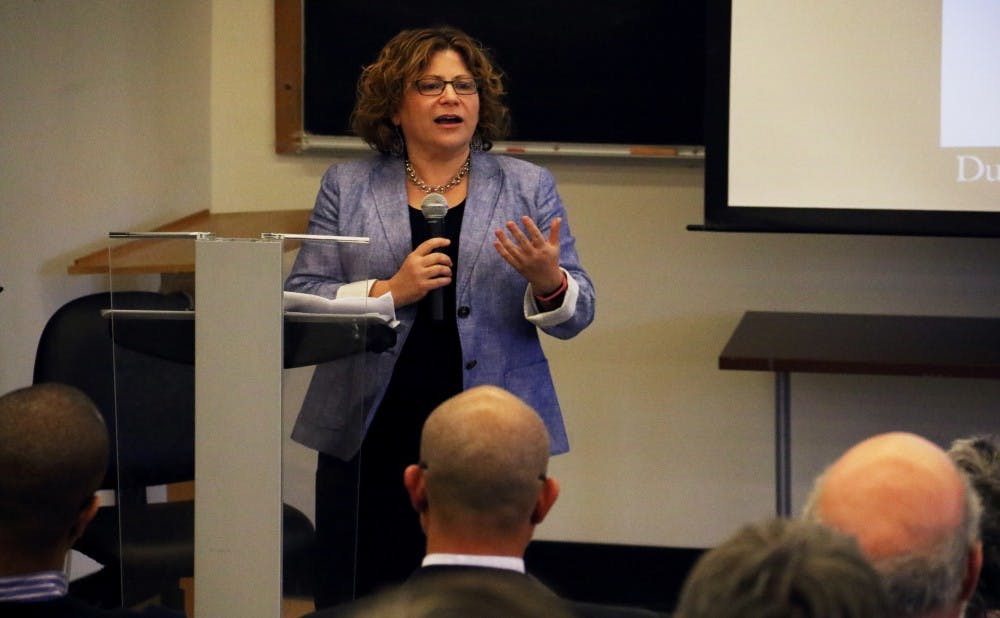Tensions surrounding the proposed Trinity curriculum came to a head at Thursday’s Arts and Sciences Council meeting.
In what is expected to be the last discussion of the curriculum before faculty vote on the proposal in April, representatives of multiple departments stated that their department had told them to vote against the document and debate was raised over the voting procedures that will be followed for it. Interim Council Chair Sheryl Broverman, associate professor of the practice of biology, said she is aware of concerns about whether faculty completely control the curriculum development process.
“Whether true or not, I’m perceptive to that concern, and I’m trying to counteract that. To that end, I disinvited President Brodhead [from the meeting],” she said. “I asked him to please reschedule to come to another time, which he very graciously understood. We didn’t want to give the perception that there is a finger on the scale or a top-down bias.”
Broverman opened the meeting by explaining the rules that the Executive Committee of the Arts and Sciences Council had determined to use for voting on the curriculum in April.
A “yes” vote will allow the proposal to move into the implementation phase. Broverman noted that she has secured in writing a promise from deans that faculty will be included in the implementation process.
A “no” vote by the council will open the curriculum up for amendments. The order of this process—a vote against the curriculum being required prior to amendments being accepted—drew the ire of Jose Gonzalez, associate professor of classical studies.
He said that the council’s bylaws mandated that the council be governed by Robert’s Rules of Order. As such, a two-thirds vote would be necessary for the council to use ECASC's recommended voting procedures.
However, Michael Munger, council parliamentarian and professor of political science, affirmed that the council's chair had the right to set the rules for debate.
Once debate about the curriculum began, several council members reported that their respective departments had instructed them to vote against the proposed curriculum. Professors launched into criticism of the curriculum on behalf of their departments:
- Alexander Rosenberg, R. Taylor Cole professor of philosophy, noted that he has been largely supportive of the curriculum throughout its long creation process, but that his department told him to vote no. He said that they preferred something more akin Brown University's "open curriculum."
- Robert Wolpert, professor of statistical science, also said he was voting against the proposal at the urging of his department. He reported that the statistics department took issue with the mentored individual research component of the curriculum.
- Frances Hasso—associate professor in Gender, Sexuality and Feminist Studies—noted that she and her department would be voting against the curriculum unless significant revisions were made.
- Reeve Huston, associate professor of history, said that his department had made it clear that they do not support the curriculum without amendments. Even with amendments, he said, the department was largely divided. After the meeting, he explained that there “seems to be a tradition” in the Arts and Sciences Council of voting as one’s department wishes.
- Mark Chaves, professor of sociology, and Beth Holmgren, professor of Slavic Studies, also said that their departments encouraged them to vote no.
- Julianne Werlin—Bacca Foundation assistant professor of rhetoric, culture and society—explained that the English department had unanimously decided to support a statement against the curriculum, which listed their concerns regarding the lack of information about the implementation stage. “We don’t know what we are voting for,” Werlin said.
- Catherine Admay, assistant director of undergraduate studies in the Sanford School of Public Policy, expressed concern about the use of the FOCUS program to fulfill the Frameworks requirements for students’ first year. She noted that this would enable students to graduate from Duke without having taken a class in each of social sciences, natural sciences and humanities.
- Christopher Walter, associate professor of physics, read a statement from the computer sciences department which said they were “optimistic with some trepidation” about the curriculum, but urged everyone to vote for or against the curriculum without amendments. Walter noted that the physics department discussed the curriculum last week and is generally supportive, but with some concerns.
The deliberation and vote on the curriculum has the potential to continue into the next academic year, Broverman explained.
“We have the fluidity from the administration to go until the first meeting in the Fall,” she said.
In other business:
The council passed a resolution to condemn President Donald Trump’s executive orders regarding the construction of a southern border wall and the prohibition of admission into the United States for individuals from certain countries. Twenty-one representatives voted for the resolution, three voted against it and four abstained.
Hasso, who authored the resolution, said she was “very pleased” that her colleagues had voted so strongly in support of it.
Get The Chronicle straight to your inbox
Sign up for our weekly newsletter. Cancel at any time.
Bre is a senior political science major from South Carolina, and she is the current video editor, special projects editor and recruitment chair for The Chronicle. She is also an associate photography editor and an investigations editor. Previously, she was the editor-in-chief and local and national news department head.
Twitter: @brebradham
Email: breanna.bradham@duke.edu

